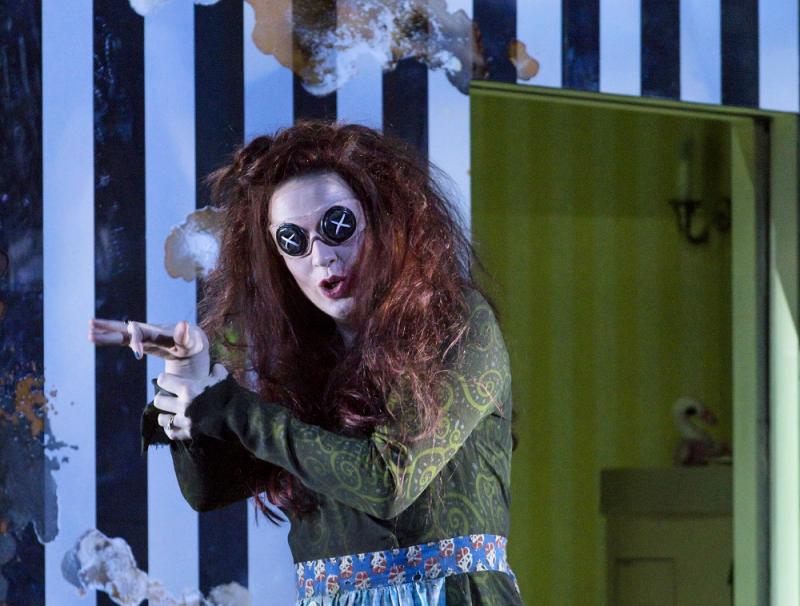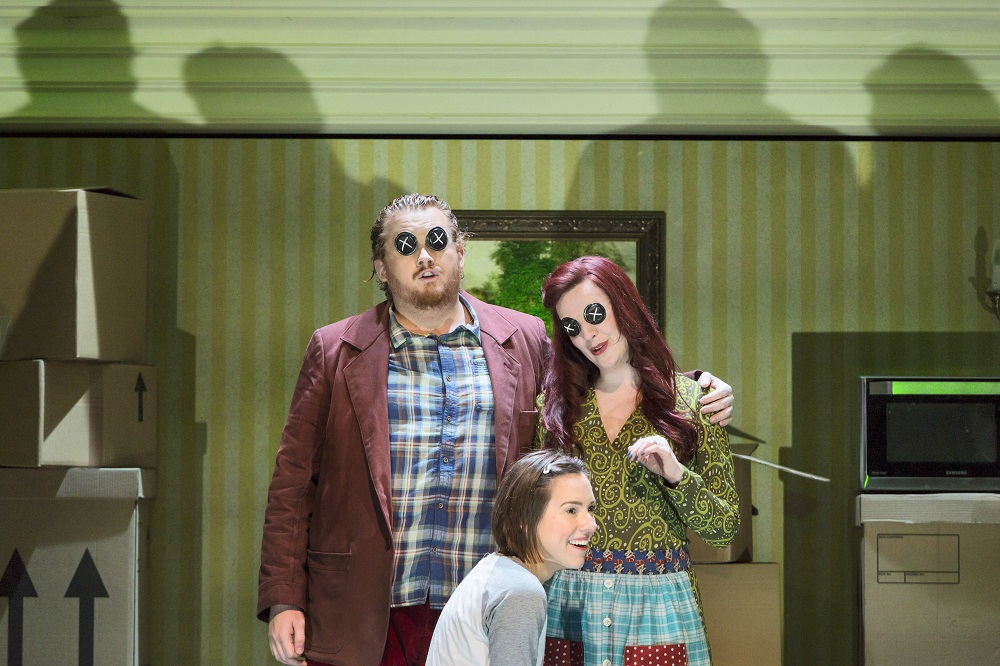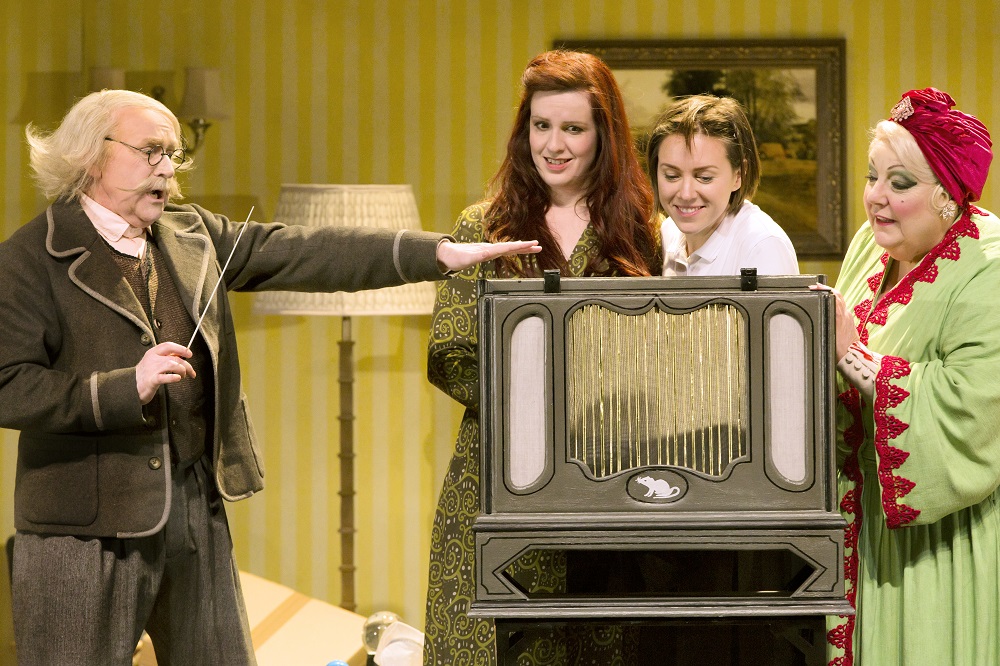Coraline, Royal Opera, Barbican review - spooky story, underwhelming score | reviews, news & interviews
Coraline, Royal Opera, Barbican review - spooky story, underwhelming score
Coraline, Royal Opera, Barbican review - spooky story, underwhelming score
Performers work hard, but Turnage's new opera isn't scary or involving enough

With the eyes of musical fashion turned relentlessly on the calculating stage works of chilly alchemist George Benjamin, hopes ran high for a brighter spark in a new opera by his contemporary Mark-Anthony Turnage.
Still, the run is sold out. I suspect that's less to do with Turnage than with literary megastar Gaiman. His novella - inexplicably not on sale at the Barbican, or I'd have bought a copy - has the kind of imaginative scariness as its premise that hooks young readers. 11-year-old Coraline finds a way in to a parallel universe where "Other Mother" offers her everything she wants, but in exchange needs to sew the buttons she and "Other Father" sport on to the girl's eyes (Alexander Robin Baker, Kitty Whately and alternative-cast Coraline Mary Bevan pictured below). It's not so much Through the Looking Glass and What Alice Found There as Hansel and Gretel, in Humperdinck's operatic version of which some productions favour doubling Mother and Witch (when the latter's not sung by a tenor). The two operas/children's stories share the same idea of enticements lacking at home - in the Grimm opera's case as much candy as you can eat - with the same deadly threat beneath the sugar.  Turnage doesn't really rise to the horror. As in The Silver Tassie, there's a doomy language at work from the start which needs more turns of the screw once Coraline goes through the dangerous door; a slight twist in unisons between low and high woodwind isn't quite enough. The chamber scoring shows a master's hand, with superb writing for oboe, cor anglais and bass clarinet especially, but the substance is less than memorable. There are only so many off-kilter pastiche tangos and waltzes a listener can take. And I suspect children need something more punchy, like Glyndebourne Youth Opera's vibrant adaptation of Janne Teller's novel for young adults Nothing, To make the neighbours interesting before the "real" story begins, for instance, the music should go up a fantastical notch or two. Though Gillian Keith and Frances McCafferty do what they can as retired thesps, and Harry Nicoll's Lithuanian Mr Bobo has strong visual context in which to tell Coraline about his mouse orchestra, the sounds of both scenes don't take off (Nicoll and McCafferty pictured below with Whately and Bevan).
Turnage doesn't really rise to the horror. As in The Silver Tassie, there's a doomy language at work from the start which needs more turns of the screw once Coraline goes through the dangerous door; a slight twist in unisons between low and high woodwind isn't quite enough. The chamber scoring shows a master's hand, with superb writing for oboe, cor anglais and bass clarinet especially, but the substance is less than memorable. There are only so many off-kilter pastiche tangos and waltzes a listener can take. And I suspect children need something more punchy, like Glyndebourne Youth Opera's vibrant adaptation of Janne Teller's novel for young adults Nothing, To make the neighbours interesting before the "real" story begins, for instance, the music should go up a fantastical notch or two. Though Gillian Keith and Frances McCafferty do what they can as retired thesps, and Harry Nicoll's Lithuanian Mr Bobo has strong visual context in which to tell Coraline about his mouse orchestra, the sounds of both scenes don't take off (Nicoll and McCafferty pictured below with Whately and Bevan).
At least Turnage's setting of Rory Mullarkey's libretto is reasonably engaging, and nearly every word can be heard in fine balance with the chamber ensemble under Sian Edwards (who conducted the world premiere of Turnage's Greek three decades ago). We missed the opening in the run-up to Easter; one compensation was to catch a rising star in the title role less well-known than natural stage animal Mary Bevan, who sings in six of the nine performance. Robyn Allegra Parton, due to make her role debut as Zerbinetta in Strauss's Ariadne auf Naxos at Longborough this summer, is no light soprano; she can really push the intensity of Coraline's discontent, yearning and sadness (which is also where the score begins to work some magic). She's convincingly youthful, though whether you buy into this being an 11 year old who still plays with dolls is another matter. Last night we also heard a second mezzo singing the two Mothers from a score at the side of the stage while a vocally indisposed Kitty Whately acted it all out to perfection on stage. Harriet Williams did a fine job, though all eyes were, as they should be, on Whately, a charismatic presence as both "good" and "bad" mums.
Last night we also heard a second mezzo singing the two Mothers from a score at the side of the stage while a vocally indisposed Kitty Whately acted it all out to perfection on stage. Harriet Williams did a fine job, though all eyes were, as they should be, on Whately, a charismatic presence as both "good" and "bad" mums.
Alexander Robin Baker invests what he can in the slightly underwritten role of the real-life inventor dad and the dispensible figure in the other world, while Dominic Sedgwick completes the trio of Ghost Children, given not quite enough free musical rein in a scene carried by its design. So the cast of seven does a good job. Giles Cadle's series of peculiar rooms make for a series of agile scene changes, though the work of the two "magic consultants" is a little underwhelming. As, I'm sorry to say, is the opera as a whole. Thanks to the subject matter, though, and its fine execution, you won't be bored.
rating
Explore topics
Share this article
The future of Arts Journalism
You can stop theartsdesk.com closing!
We urgently need financing to survive. Our fundraising drive has thus far raised £49,000 but we need to reach £100,000 or we will be forced to close. Please contribute here: https://gofund.me/c3f6033d
And if you can forward this information to anyone who might assist, we’d be grateful.

Subscribe to theartsdesk.com
Thank you for continuing to read our work on theartsdesk.com. For unlimited access to every article in its entirety, including our archive of more than 15,000 pieces, we're asking for £5 per month or £40 per year. We feel it's a very good deal, and hope you do too.
To take a subscription now simply click here.
And if you're looking for that extra gift for a friend or family member, why not treat them to a theartsdesk.com gift subscription?
more Opera
 La bohème, Opera North review - still young at 32
Love and separation, ecstasy and heartbreak, in masterfully updated Puccini
La bohème, Opera North review - still young at 32
Love and separation, ecstasy and heartbreak, in masterfully updated Puccini
 Albert Herring, English National Opera review - a great comedy with depths fully realised
Britten’s delight was never made for the Coliseum, but it works on its first outing there
Albert Herring, English National Opera review - a great comedy with depths fully realised
Britten’s delight was never made for the Coliseum, but it works on its first outing there
 Carmen, English National Opera review - not quite dangerous
Hopes for Niamh O’Sullivan only partly fulfilled, though much good singing throughout
Carmen, English National Opera review - not quite dangerous
Hopes for Niamh O’Sullivan only partly fulfilled, though much good singing throughout
 Giustino, Linbury Theatre review - a stylish account of a slight opera
Gods, mortals and monsters do battle in Handel's charming drama
Giustino, Linbury Theatre review - a stylish account of a slight opera
Gods, mortals and monsters do battle in Handel's charming drama
 Susanna, Opera North review - hybrid staging of a Handel oratorio
Dance and signing complement outstanding singing in a story of virtue rewarded
Susanna, Opera North review - hybrid staging of a Handel oratorio
Dance and signing complement outstanding singing in a story of virtue rewarded
 Ariodante, Opéra Garnier, Paris review - a blast of Baroque beauty
A near-perfect night at the opera
Ariodante, Opéra Garnier, Paris review - a blast of Baroque beauty
A near-perfect night at the opera
 Cinderella/La Cenerentola, English National Opera review - the truth behind the tinsel
Appealing performances cut through hyperactive stagecraft
Cinderella/La Cenerentola, English National Opera review - the truth behind the tinsel
Appealing performances cut through hyperactive stagecraft
 Tosca, Royal Opera review - Ailyn Pérez steps in as the most vivid of divas
Jakub Hrůša’s multicoloured Puccini last night found a soprano to match
Tosca, Royal Opera review - Ailyn Pérez steps in as the most vivid of divas
Jakub Hrůša’s multicoloured Puccini last night found a soprano to match
 Tosca, Welsh National Opera review - a great company reduced to brilliance
The old warhorse made special by the basics
Tosca, Welsh National Opera review - a great company reduced to brilliance
The old warhorse made special by the basics
 BBC Proms: The Marriage of Figaro, Glyndebourne Festival review - merriment and menace
Strong Proms transfer for a robust and affecting show
BBC Proms: The Marriage of Figaro, Glyndebourne Festival review - merriment and menace
Strong Proms transfer for a robust and affecting show
 BBC Proms: Suor Angelica, LSO, Pappano review - earthly passion, heavenly grief
A Sister to remember blesses Puccini's convent tragedy
BBC Proms: Suor Angelica, LSO, Pappano review - earthly passion, heavenly grief
A Sister to remember blesses Puccini's convent tragedy
 Orpheus and Eurydice, Opera Queensland/SCO, Edinburgh International Festival 2025 review - dazzling, but distracting
Eye-popping acrobatics don’t always assist in Gluck’s quest for operatic truth
Orpheus and Eurydice, Opera Queensland/SCO, Edinburgh International Festival 2025 review - dazzling, but distracting
Eye-popping acrobatics don’t always assist in Gluck’s quest for operatic truth

Add comment